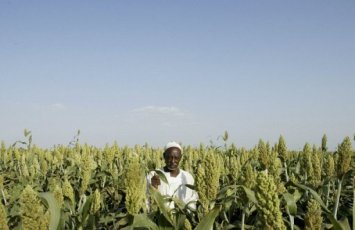Sudanese minister paints bleak picture for agricultural sector
January 16, 2013 (KHARTOUM) – The Sudanese agriculture minister Abdul Halim Ismail al-Mutafi acknowledged that the agricultural sector in the country has underperformed as a result of “wrong economic policies”.

The minister made these statements during his meeting with the Union of Gedaref farmers in East Sudan.
He pointed out that the productivity of Sudan at its best reached five million tonnes compared to the thirty thousand tonnes globally.
Once hoped to be the breadbasket of the Arab world, Sudan’s agricultural sector has continued to deteriorate over the years mainly as a result of negligence, drought, mismanagement and the overall economic climate.
Sudanese farmers often complain about the high costs of imported materials such as fertilizers. Many of them were sent to jail as their debt piled up.
Several ambitious plans enacted to bring life to this sector have failed to materialize and critics say the government forfeited a golden opportunity during the oil boom to boost agriculture.
Foreign investors also complain about lack of infrastructure and unfriendly laws which they say deters them from putting money in Sudan’s vast farmlands.
The agriculture minister spoke about plans to cultivate 50,000 feddans (21,000 hectares) in Gedaref as a pilot project and revealed that Iran provided a 30 million Euros loan to import machinery.
He added that new seeds and Brazilian fertilizers will be rolled out that will help improve productivity of agricultural lands to almost 500,000 ton per feddan.
Sudanese officials say that they are refocusing on agriculture as part of the broader economic plan to find alternatives to oil most of which went over to South Sudan following its independence in July 2011.
(ST)
